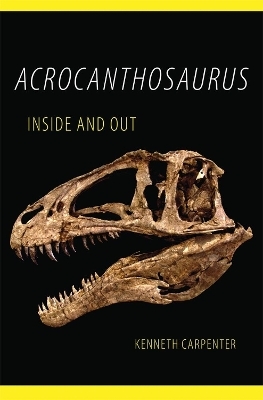
Acrocanthosaurus Inside and Out
Seiten
2023
University of Oklahoma Press (Verlag)
978-0-8061-9154-6 (ISBN)
University of Oklahoma Press (Verlag)
978-0-8061-9154-6 (ISBN)
How can paleontologists know what a living dinosaur was like more than a hundred million years ago, particularly when only partial skeletons remain? Focusing on one large carnivorous dinosaur, Acrocanthosaurus, paleontologist Kenneth Carpenter explains the process, pairing scholarly findings with more than 75 colour illustrations.
How can paleontologists know what a living dinosaur was like more than a hundred million years ago, particularly when only partial skeletons remain? Focusing on one large carnivorous dinosaur, Acrocanthosaurus (“high-spined lizard”), paleontologist Kenneth Carpenter explains the process, pairing scholarly findings with more than 75 color illustrations to reconstruct “Acro” before readers’ eyes. In Acrocanthosaurus Inside and Out, he offers the most complete portrait possible of this fascinating dinosaur’s appearance, biology, and behavior.
Acrocanthosaurus—similar in size to its later cousin Tyrannosaurus rex, but studded with large spines—roamed what is now the south-central United States 110 to 115 million years ago, during the Early Cretaceous. Carpenter worked on the most complete of the Acrocanthosaurus skeletons (nicknamed “Fran”) that has been found. Here he describes the techniques that tell us about Acro’s biological makeup, movements, and habits. Studies of joints reveal the range of possible motion, while bumps, ridges, and scars on the bones show where muscles, ligaments, and tendons attached. CT scans allow us to peer into the braincase, while microscopes afford a cross-sectional view of bones. These findings in turn offer an idea of how Acro stalked and ate its prey.
Scientific evidence beyond the fossils provides avenues for further inquiry: What does the sedimentary rock encasing Fran’s bones tell us about Acro’s environment? What does our knowledge of Acro’s distant relatives, such as crocodilians and birds, imply about its heart and other soft tissues? Can our understanding of other animals explain Acro’s huge spines?
Carpenter distills all this information into a clear, accessible, engaging account that will appeal to general readers and scholars alike. As the first book-length work on Acrocanthosaurus, this volume introduces a prehistoric giant that once stalked Texas and Oklahoma and offers a rare, firsthand glimpse into the trials and triumphs of paleontology.
How can paleontologists know what a living dinosaur was like more than a hundred million years ago, particularly when only partial skeletons remain? Focusing on one large carnivorous dinosaur, Acrocanthosaurus (“high-spined lizard”), paleontologist Kenneth Carpenter explains the process, pairing scholarly findings with more than 75 color illustrations to reconstruct “Acro” before readers’ eyes. In Acrocanthosaurus Inside and Out, he offers the most complete portrait possible of this fascinating dinosaur’s appearance, biology, and behavior.
Acrocanthosaurus—similar in size to its later cousin Tyrannosaurus rex, but studded with large spines—roamed what is now the south-central United States 110 to 115 million years ago, during the Early Cretaceous. Carpenter worked on the most complete of the Acrocanthosaurus skeletons (nicknamed “Fran”) that has been found. Here he describes the techniques that tell us about Acro’s biological makeup, movements, and habits. Studies of joints reveal the range of possible motion, while bumps, ridges, and scars on the bones show where muscles, ligaments, and tendons attached. CT scans allow us to peer into the braincase, while microscopes afford a cross-sectional view of bones. These findings in turn offer an idea of how Acro stalked and ate its prey.
Scientific evidence beyond the fossils provides avenues for further inquiry: What does the sedimentary rock encasing Fran’s bones tell us about Acro’s environment? What does our knowledge of Acro’s distant relatives, such as crocodilians and birds, imply about its heart and other soft tissues? Can our understanding of other animals explain Acro’s huge spines?
Carpenter distills all this information into a clear, accessible, engaging account that will appeal to general readers and scholars alike. As the first book-length work on Acrocanthosaurus, this volume introduces a prehistoric giant that once stalked Texas and Oklahoma and offers a rare, firsthand glimpse into the trials and triumphs of paleontology.
Kenneth Carpenter is the Director and Curator of the Prehistoric Museum of Utah State University–Eastern. He received the Ph.D. in geology from the University of Colorado in 1996. From 1989 until 2010, he worked at the Denver Museum of Nature and Science. He has written hundreds of both scholarly and popular articles and encyclopedia entries on dinosaurs. Among other books, he is the author of Eggs, Nests, and Baby Dinosaurs: A Look at Dinosaur Reproduction.
| Erscheinungsdatum | 01.07.2022 |
|---|---|
| Zusatzinfo | 71 color and 10 b&w illus. |
| Verlagsort | Oklahoma |
| Sprache | englisch |
| Maße | 156 x 235 mm |
| Gewicht | 345 g |
| Themenwelt | Sachbuch/Ratgeber ► Natur / Technik ► Naturwissenschaft |
| Naturwissenschaften ► Geowissenschaften ► Mineralogie / Paläontologie | |
| ISBN-10 | 0-8061-9154-6 / 0806191546 |
| ISBN-13 | 978-0-8061-9154-6 / 9780806191546 |
| Zustand | Neuware |
| Haben Sie eine Frage zum Produkt? |
Mehr entdecken
aus dem Bereich
aus dem Bereich
Die glänzenden und die dunklen Jahre der Physik 1895-1945
Buch | Softcover (2023)
Klett-Cotta (Verlag)
14,00 €
wie sie denkt, fühlt und Probleme löst
Buch | Hardcover (2024)
Folio (Verlag)
26,00 €


